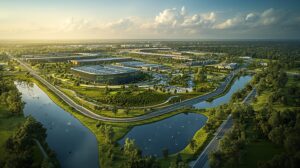
300,000 Jobs Are Open Right Now (And No One’s Talking About It)
An interview with Carrie Goetz, Principal/CTO at StrategITcom, Amazon Best Selling Author
Q: For those unfamiliar with data centers, what key aspects of this sector should everyone understand?
Every person has digital “twins” in data centers. These facilities contain our digital information, which is scattered (stored) across several data centers. Data centers are where the cloud lives. They are also ecosystems of computer equipment, networking gear, and the power and cooling environments needed for operations.
Data centers are connected to the Internet for communications. These facilities are critical to our functioning. The applications in data centers provide email, photos, conversations, streaming services, health and tax records, credit reports, autonomous vehicle controls, precision farming, and our digital things.
Careers in the industry include sustainability, green energy, construction, heavy equipment, electricians, plumbers, masons, information technology careers, and many more! This industry supports our way of life. Almost every company either owns or uses at least one data center, and nearly everyone can find a career in one.
Most schools introduce technology to students in the form of coding. However, there is more to data centers and technical careers than coding. In fact, coding is a very small portion of what happens in a data center facility. Coding is a tiny fraction of available technology careers.
Not all data centers are the same, but all provide continuous learning environments. We have over 300,000 open jobs within the industry that need filling by 2025. If one thinks about every password in their phone, that is quite possibly the number of data centers you touch.
Information in one data center is backed up in other data centers. We are stardust; we are bits and bytes. We are scattered around the ether. Just like we maintain our brick and mortar homes, we also need to maintain our digital homes. We must provide digital security just like we provide door locks.
Q: What types of careers and jobs are available within data centers? With automation and AI reshaping industries, how do you see technology affecting job opportunities in this space?
As mentioned above, the careers are vast and incorporate jobs from construction to the cloud. The important thing to remember is that most of our jobs don’t require a college degree. College is a very slow moving force. There are very few data center majors out there. From the time we started building computing centers to today, so much of our industry is an ongoing apprenticeship. People learn from other people.
Those beginning their data center careers will have a plethora of options around them. Data centers exist everywhere. Every company either uses one or owns its own. Once built, many of the trades and operations jobs are still needed for maintenance and operations. These jobs will never run out.
We are also ideally suited for transitioning military members due to their expertise in construction, information technology, and communications. We have OJT for so many others. We are seeing apprenticeships forming around the industry, as we currently have over 300,000 open jobs that need to be filled by 2025. Many data center employers will pay for those seeking degrees. If you choose to come in as skilled labor, you are valued here in equal measure.
With automation and AI, we will continue to have intelligence to help troubleshoot problems, create new technologies and applications, and view information in new ways. While there may be a shift in employment, it won’t eliminate jobs. Instead, new jobs and new ways to do old jobs emerge. For example, critical thinking is not often taught. We need to be ever mindful of garbage in and garbage out.
Automation removes the mundane and helps eliminate and automate some tasks. But in my mind, that frees up people’s resources for more strategic thinking. We will need people to verify the results and scan for bias. As the industry grows, so do the opportunities. Data is not only critical for accountability, it can be a driver for change and improvement.
One thing to consider here is the amount of money that people and companies spend reimbursing the cost of electives that have little to do with company functions. If a company were to reevaluate its tuition reimbursement and exclude electives, the savings could fund apprenticeship programs that would continue to bring fresh talent into the organization.
Q: What are the most important skills that students should be developing today to prepare for successful careers in technology and data centers?
I think the key is to figure out what your passion is first. Do you like working with your hands? Do you enjoy chaos, or do you prefer a more calm environment? Do you like to code or hate coding? Do you love engineering? I think the key here is to understand your passions and the industry. Then, it will be easier to decide.
Despite everyone using data centers, it is still a relatively unknown industry. Some of our invisibility is a self-inflicted wound as, for years, we have kept data centers secret due to risk. We are trying to solve that now. But most importantly, I think, is that if you don’t like something about technology, look at the variety of other adjacent and related jobs. People don’t think about electricians and HVAC techs, for example. But they have a place here.
The depth and breadth of jobs is vast. That was a big part of the reason for the first book, Jumpstart Your Career in Data Centers. How are people supposed to find jobs in the industry if they don’t know what they are and where to look? The Educator’s Reference helps teachers with key takeaways and classroom experiments to add this information to their other classes. And Polly Packet’s Precious Payload: All Smiles to the Data Center introduces these concepts to kids.
Our youth are largely digitally native, but we don’t introduce jobs to them at a young age. Most kids decide what they want to be by the time they are 7 or 8 years old. If these careers are not in their purview, how would they consider them moving forward?
Q: Why do you believe there is such a large talent gap in the data center sector, and what steps can educational institutions take to better prepare students for these opportunities?
First, we need more curricula that incorporate the industry. We teach coding, for example, but coding classes don’t teach about data centers where the code lives. Kids who dislike coding tend to excuse all technology from career plans if they are shielded from other options.
We teach skilled trades, but not necessarily the industries that use them. There are some capstone projects that add data centers to engineering courses. But we have very few majors in mission critical and data centers.
In my mind, we are very elitist pushing college as a solution for everything. We engineer out diversity in doing so. We must embrace people where and how they want to learn and work. Embracing the trades is critical to our ongoing success. Embracing apprenticeships is paramount.
We need to be more present at career days. We need more technology exposure than just coding. We need these careers to be presented to younger kids so they set their eyes on them as opposed to falling into these careers later in life. We need our technical consumers to understand more about their digital footprints and where their life information “lives.”
Organizations that promote scholarships should open up that funding to include trades and vocational-technical schools. There is resistance to fostering the trades amongst many with degrees, and I think that is criminal. True innovation happens when we combine people with different backgrounds, education, and experiences to solve problems. We must embrace innovation to thrive. It isn’t an us vs them equation with respect to technology. We all use it; we all need it. We all need to have a better understanding.
Q: How can businesses and educators work together to make apprenticeships in data centers more accessible and attractive to young people?
Most apprenticeship programs work when there are sponsoring employers. I think what most employers miss is the fact that there are nonprofits whose sole charters are help businesses create apprenticeships through the Department of Labor. I am working with one, Florida Trade Academy, but of course, there are others.
Employers receive funding from the government to offset the cost at a rate of $500 per employee at present. Being able to utilize these services to create the curriculum, fill a pipeline with talent to take it, and assist with the paperwork and overall processes makes the creation of an apprenticeship program significantly easier and very cost effective. There are several smaller programs, but I believe we are playing catch-up at the moment. We ignored the skills gap for too long.
In fact, most of the educators that I have worked with and classrooms I zoom into don’t know what a data center is, much less what and where the jobs are in the industry. I wrote an article a while back called The Great Talent Suck that discusses how the larger data center cities take all of the talent. The truth is that data center facilities are everywhere, not just the data center cities. But if we don’t discuss them in schools, the only way a student hears about them is if they know someone in the industry, or worse, because of a job opportunity and they are flying blind.
My books were written to accompany other coursework as a means of introduction. We need more introductions. As long as people keep viewing introductions as someone else’s responsibility, we will be in this same boat 10 years from now. So many schools won’t allow people to discuss data centers because it isn’t in the approved curriculum.
As a matter of fact, a friend of mine in the industry tried to discuss data centers with her son’s class. She was told she couldn’t because the teacher didn’t have it on the approved curriculum list, but that she could read a book about farts. (True story and the reason Polly Packet’s was written). Maybe we can get noticed in story form.
Lastly, talk about the industry! If we don’t talk about it, the perception is that it doesn’t exist. We take for granted that it is just there. We are currently running up against power problems, particularly for AI. We need new talent and bright minds to become stewards of our resources. We need diversity to make tech work for everyone.









